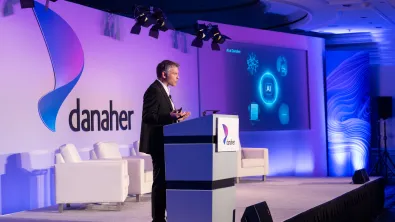Shane Swinehart had never given much thought to polystyrene. As a Site Leader for Danaher’s Cytiva office in New Zealand, he viewed the material — known as Styrofoam —as an effective, industry-standard tool for ensuring the company’s therapies were packaged and shipped to healthcare providers at the right temperature and without incident. In 2019, however, an underwater excursion irrevocably changed his perspective.
“I was on a diving trip with my family in Indonesia and I saw dozens of fish and sea turtles eating plastic—it was distressing,” said Swinehart.
In therapeutics, temperature is key to delivering lifesaving vaccines and therapeutics. From COVID-19 boosters to shingles vaccines, the industry relies on cold packs, chilled boxes and other specialized packaging — especially polystyrene — to ensure global and domestic shipments meet cold shipping regulations so products are still viable when they reach patients. But while polystyrene is effective in healthcare shipments, it can pose a significant threat to wildlife: it makes up for 10-40 percent of plastics found in waterways and is littered more than any other waste product.
“Witnessing this kind of pollution firsthand, I knew I had to do something,” said Swinehart, “Everyone has a voice at Danaher — I wanted to use mine to create a healthier planet for all of its inhabitants.”
A bold ambition
At Danaher, associates’ perspectives are welcomed and invited when it comes to sustainability prioritization and innovation. In fact, hundreds of associates played a role in shaping the company’s sustainability strategy in 2022, helping the organization determine which efforts were mission critical to the business and the planet—including investment in a more sustainable supply chain.
For Swinehart, the ability to enact company-wide change became possible faster than he imagined thanks to Cytiva’s inaugural Innovation Accelerator Program. In January 2020, Cytiva invested more than $3 million to launch the accelerator program which aims to source and scale in-house innovation by addressing timely challenges within the pharmaceutical industry.
The first challenge? Identifying business opportunities that could help benefit the environment.
Swinehart’s idea was to remove polystyrene from the Cytiva supply chain in Australia and New Zealand—a vision requiring access to global data and resources.
Enter colleagues Brandon Papke and Thibault Renaud. These two Cytiva associates, based in the U.S. and France, respectively, paired up with Swinehart to create a project team they dubbed “Cargo Kiwi”. Papke, a Materials Control Manager, and Renaud, a Global Sustainability Supply Chain Leader, leveraged their collective expertise to collaborate with customers and suppliers on finding a sustainable solution.
What started as a smaller scale, multimarket approach, however, quickly became an ambitious proposal to replace all polystyrene packaging around the world. “Cargo Kiwi became one of six finalists selected by investors to receive funding for a year,” said Papke. “To our surprise, we were given the time, resources and expertise we needed to test and create a prototype that could be rolled out across all markets.”
From idea to impact
After months of meticulous testing, and collaboration with Cytiva’s packaging partner TemperPack, Cargo Kiwi’s concept became a commercial reality in April 2023. Cytiva announced the launch of a recyclable and 90 percent renewable packaging solution that would replace polystyrene with new liners primarily made from paper and corn starch.
“Working side by side with my colleagues was inspiring and speaks to the power of collaboration and different perspectives,” said Renaud. “Having leaders from different regions come together to bring this solution to life allowed us to expand our impact to a global scale.”
By 2025, polystyrene will be eliminated from Cytiva packaging completely, supporting Danaher’s ambitious waste reduction goal to reduce the amount of non-hazardous, non-regulated waste sent to landfill by 15 percent. Once this packaging solution deploys globally by the end of 2024, an estimated 60,000 polystyrene boxes will be eliminated from the environment each year—the equivalent of 71 ocean shipping containers.
“Sustainability has always been the engine behind our innovation,” said Emmanuel Abate, Cytiva’s President of Genomic Medicine. “I’m proud to lead a team where associates are not only heard but can and do make a difference—turning big ideas into tangible impact.”



